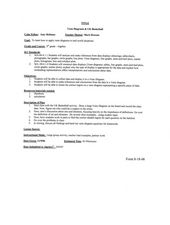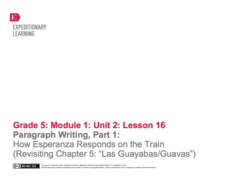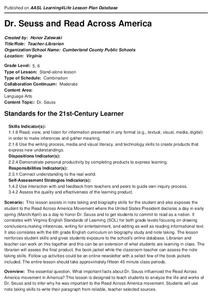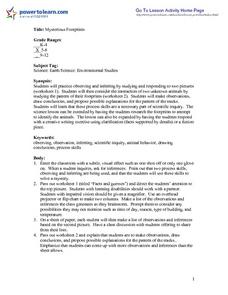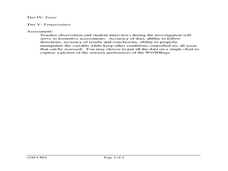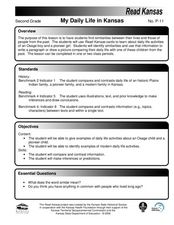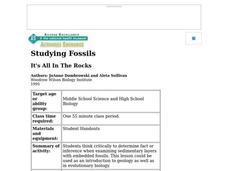Curated OER
Hitting the Trail
Students read a short selection about the Jr. Iditarod race. They use a webquest to analyze information from the reading and answer a series of questions. The questions focus on fact-finding and making inferences.
Curated OER
Cell Game
Make a prototype of a game based on cell biology. Researching game design and working in groups to create a game will activate knowledge of cell biology. The review task will help students learning as they test out the games and their...
National Center for Case Study Teaching in Science
A Case Study of Memory Loss in Mice
Using a short news article, high school or college biologists examine the scientific method in practice. The article, which focuses on an Alzheimer's experiment performed on rats, has very limited information, so learners must be...
Curated OER
Venn Diagram and UK Basketball
Students analyze data and make inferences. In this algebra lesson, students collect and analyze data as they apply it to the real world.
Curated OER
Venn Diagrams
Students collect and display data in a Venn Diagram. In this statistics lesson, students collect data, compare the data and make inferences about their data. They use the Venn diagrams to identify what the data have in common and how...
Museum of Tolerance
Developing Media Literacy
To protect young people from questionable content, many schools limit access. This resource suggests that because learners can so readily avail themselves to unrestricted Internet access, it is vital for 21st century...
American Statistical Association
Confidence in Salaries in Petroleum Engineering
Just how confident can we be with statistics calculated from a sample? Learners take this into account as they look at data from a sample of petroleum engineer salaries. They analyze the effect sample size has on a margin of error and...
Novelinks
The Lion, the Witch, and the Wardrobe: Picture Book Strategy
Picture books aren't just for primary learners. Your scholars compare and contrast literary themes between the novel, The Lion, the Witch, and the Wardrobe by C.S. Lewis, and the children's book, The Dream Tree by Winfried...
EngageNY
Paragraph Writing, Part II
Come up with a list of requirements for this expository essay on Esperanza's character in Esperanza Rising as a class and use the list to guide class writing. Here, learners will complete the first paragraph, discuss their notes for the...
EngageNY
Paragraph Writing, Part 1: How Esperanza Responds on the Train (Revisiting Chapter 5: "Las Guayabas/Guavas")
When your class members have completed the novel Esperanza Rising, they will be ready to write an expository essay on how Esperanza responds to events and what this says about her character. Set your pupils up for success by...
EngageNY
Paragraph Writing: The Role of Religion in Colonial America
Informative writing is emphasized in the standards. Help your learners reach that goal with the plan for paragraph writing outlined here. After reviewing the work from the day before and adding to their vocabulary notebooks, class...
Curated OER
Dr. Seuss and Read Across America
What important facts about Dr. Seuss influenced the Read Across America movement...? This is the driving question of a research project that requires scholars to find information about Dr. Seuss' life and work. Class...
University of Georgia
Using Freezing-Point Depression to Find Molecular Weight
Explore the mathematical relationship between a solvent and solute. Learners use technology to measure the cooling patterns of a solvent with varying concentrations of solute. Through an analysis of the data, pupils realize that the...
Curated OER
Transparent Shoebox Dig
Take this simulated archaeological dig one layer at a time with your young pupils to encourage observation, critical thinking, and careful attention. Using a transparent box full of layers of sand and artifacts, pupils examine the...
Odell Education
Scientific Process and Experimental Design
The scientific method keeps you from believing only what you want to believe — it expands your mind. The instructional activity introduces the eight steps in the scientific process and how to design an experiment to biology scholars....
Towson University
Looking Backwards, Looking Forward
How do scientists know what Earth's climate was like millions of years ago? Young environmental scholars discover how researchers used proxy data to determine the conditions present before written record. Grouped pupils gain experience...
Curated OER
Application and Modeling of Standard Deviation
The first activity in this resource has learners computing the mean and standard deviation of two different data sets and drawing conclusions based on their results. The second activity has them using a dice-rolling simulation to...
California Academy of Science
Human Evolution
As the great and hilarious Tim Minchin once said, "Science is simply the word we use to describe a method of organizing our curiosity." Science is more than just a guess; it is based on questions, observations, and evidence. High...
Curated OER
Get a Clue: What is There and What Isn't
Young scholars practice the ability to examine and analyze evidence and extract information that eventually leads to deductive conclusions. After evaluating the objects discovered in a box, students write a one-page reflection paper of...
Curated OER
Mysterious Footprints
Students, after observing and responding to two pictures, consider the interaction of two unknown animals by examining the pattern of their footprints. They make observations, draw conclusions and propose possible explanations for the...
Curated OER
The Nature of Science and Technology
Second graders perform a variety of experiments to observe, form conclusions, and make inferences. In this experiment lesson, 2nd graders experiment based on the result of a pre-assessment. Students share what they have learned.
Ohio Department of Education
Observe Then Infer
Upper elementary scientists learn that observations made can lead to inferences. They rotate through six weather-related stations that challenge them to make observations and then draw inferences from their observations. A...
Curated OER
My Daily Life in Kansas
Second graders use 'Read Kansas' cards to learn about the daily life activities of an Osage boy and a pioneer girl. In this similarities and differences lesson, 2nd graders write a paragraph and draw a picture comparing...
Curated OER
It's All in the Rocks
Students think critically to determine fact or inference when examining sedimentary layers with embedded fossils. They are being introduced to geology as well as evolutionary biology.





